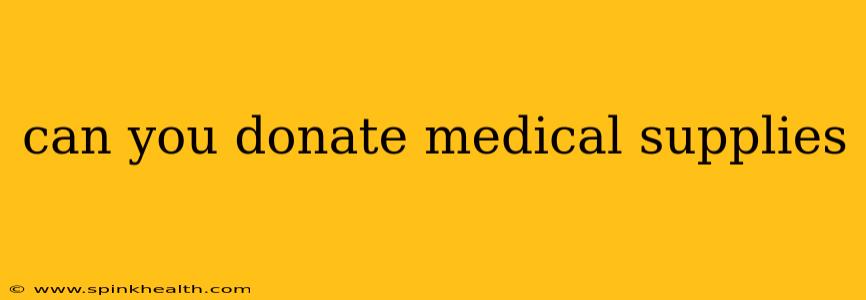Can You Donate Medical Supplies? A Guide to Making a Difference
The desire to help others in need is a powerful motivator, and for many, that extends to donating medical supplies. Whether it's a surplus of bandages from a first-aid kit clean-out or a larger-scale donation of unused equipment, the question arises: Where and how can I donate medical supplies effectively? This isn't a simple yes or no answer. The process involves understanding the needs, the regulations, and the best way to ensure your donation makes a real impact. Let's explore this journey together.
What Types of Medical Supplies Can Be Donated?
This is a crucial first step. Not all medical supplies are created equal when it comes to donation. Think about it like this: a nearly-expired box of bandages might not be as useful as a shipment of new, sterile surgical tools. The usefulness depends on several factors:
- Expiration Dates: This is paramount. Expired medications and supplies are often unsafe and cannot be used. Check all expiration dates before considering a donation.
- Condition: Supplies must be in new or gently used condition, clean, and undamaged. Anything broken, damaged, or visibly soiled should be discarded responsibly.
- Type of Supply: High-demand items include bandages, gauze, antiseptic wipes, gloves (especially sterile ones), first-aid kits, and basic medical equipment. However, more specialized equipment requires careful consideration and often needs to be donated through specific channels.
Where Can I Donate Medical Supplies?
This is where the journey gets more specific. There isn't a single, universal answer. Your options depend on the type and quantity of supplies you have:
- Local Hospitals and Clinics: Many hospitals and clinics accept donations, particularly of commonly used items. However, it's crucial to contact them directly beforehand to inquire about their current needs and acceptance policies. They may have specific procedures for donations and might not accept everything.
- Disaster Relief Organizations: In the aftermath of natural disasters or humanitarian crises, organizations like the Red Cross often have urgent needs for medical supplies. Research organizations actively involved in relief efforts in your region or globally.
- Nonprofit Organizations: Numerous nonprofits focus on providing medical care to underserved populations, both domestically and internationally. Research local and international organizations aligned with your values.
- Free Clinics and Community Health Centers: These facilities often serve individuals who lack access to affordable healthcare and may gratefully receive donations of essential supplies.
- Veterinary Clinics: If you have pet-related medical supplies in good condition, consider contacting local animal shelters or veterinary clinics.
What Medical Supplies Are Most Needed?
The demand fluctuates, but some consistently needed items include:
- Bandages and Gauze: Always in high demand for minor injuries and wound care.
- Antiseptic Wipes and Solutions: Crucial for preventing infection.
- Gloves (Sterile and Non-Sterile): Essential for hygiene and infection control.
- First-Aid Kits: Useful for a wide range of situations.
- Basic Medications (with careful consideration of expiration dates): Consult with the recipient organization before donating medications.
How Do I Ensure My Donation Is Safe and Effective?
- Contact First: Always contact the potential recipient organization before you bring your donation. This ensures they can accept it and provides clarity on their specific needs and procedures.
- Proper Packaging: Package your donation carefully to prevent damage during transit. Clearly label the contents and any relevant expiration dates.
- Documentation: Keep records of your donation, including the date, the recipient organization, and a list of the supplies donated. This is useful for tax purposes (in countries where donations are tax-deductible) and for your own records.
Donating medical supplies can be incredibly rewarding. By taking the time to understand the needs of recipient organizations and following proper procedures, you can make a significant contribution to improving the health and well-being of individuals and communities in need. Remember, responsible donation is key to ensuring the effectiveness and safety of your contribution.

